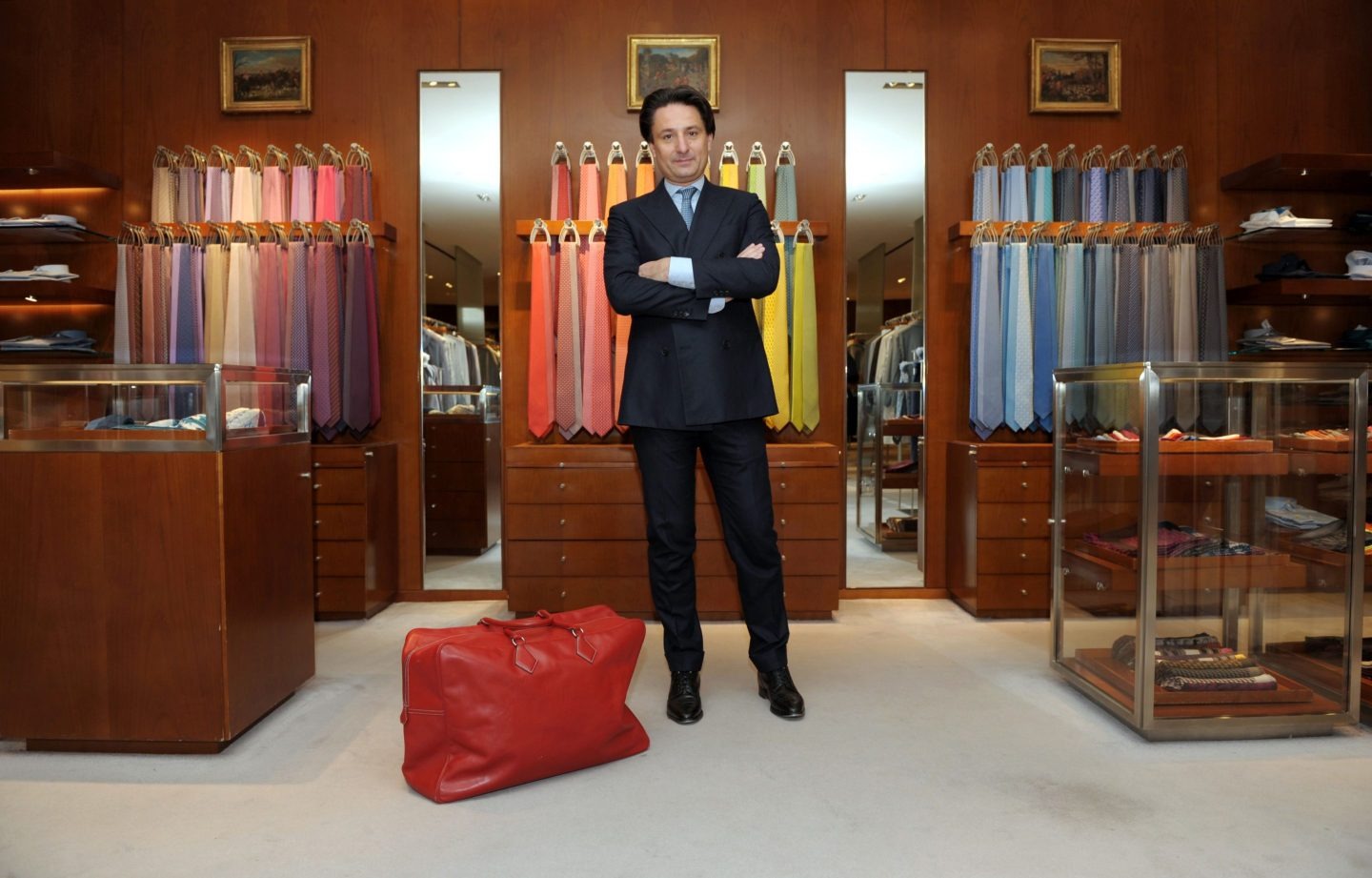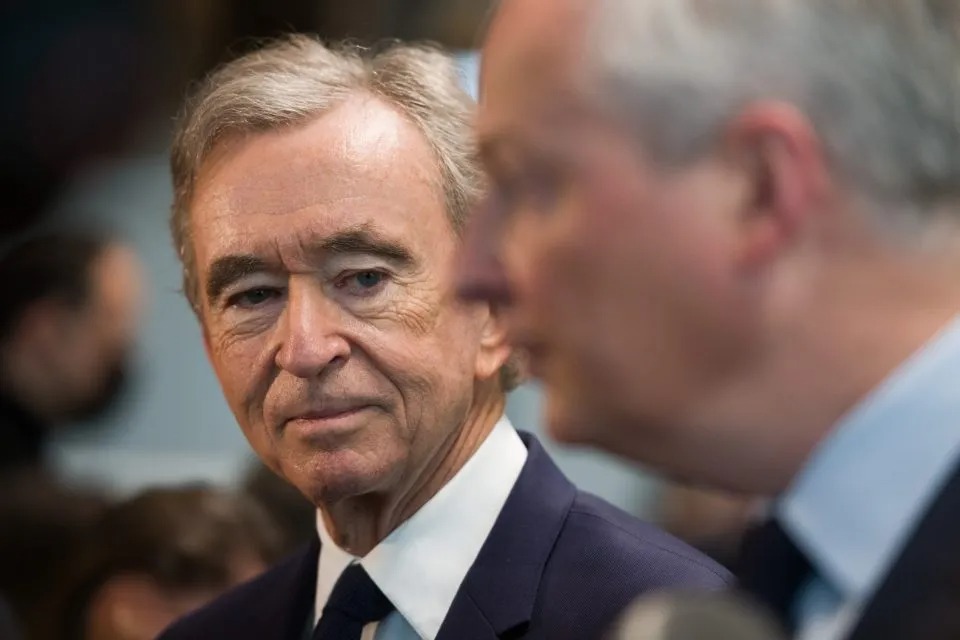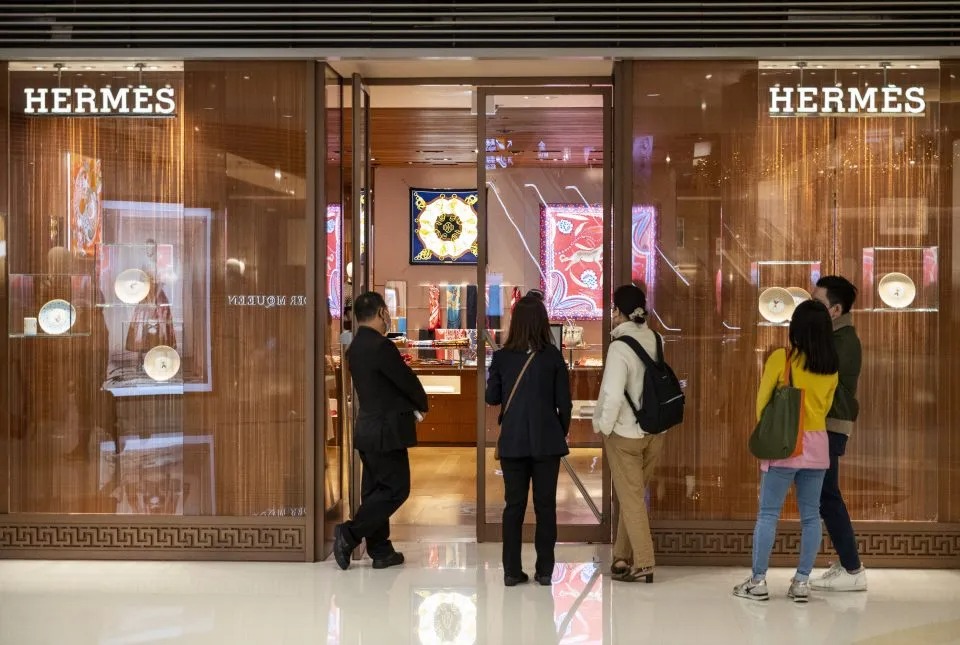
愛馬仕與路易威登的母公司路威酩軒集團(LVMH)一樣,,都是奢侈品行業(yè)的佼佼者,。但愛馬仕的掌門人阿克塞爾·杜馬斯卻不愿將愛馬仕與曾試圖收購柏金包制造商(但以失敗告終)的法國企業(yè)集團相提并論。
很難不把這兩家公司進行比較:它們都是法國公司,,在業(yè)務(wù)上都有家族聯(lián)系,,而且都在爭奪用于購買高端手袋的資金。
這兩家公司之間的歷史充滿了戲劇性,,包括不受歡迎的收購,、訴訟,以及最近在奢侈品市場上的不同命運,。
疫情后,,奢侈品行業(yè)面臨挑戰(zhàn)。隨著人們開始縮減開支,,許多奢侈品公司的財富縮水,。但愛馬仕每個季度都能逆勢而上。
美國銀行(Bank of America)今年7月指出,,2024年第二季度,,該公司在奢侈品行業(yè)的收入增幅最高。
愛馬仕目前的市值為2280億歐元,,而路威酩軒集團的市值為3310億歐元,。但分析師預(yù)計,到2027年,,這家柏金包制造商將超越貝爾納·阿爾諾(Bernard Arnault)的奢侈品集團,。這是一項重大成就,因為路威酩軒集團長期以來一直是奢侈品行業(yè)的重量級企業(yè),,其影響力遍及奢侈品行業(yè)的各個領(lǐng)域,。
但杜馬斯并不喜歡這種比較。事實上,,超過路威酩軒集團的規(guī)模甚至不是愛馬仕的基準(zhǔn),。

“我們銷售的產(chǎn)品(與路易威登銷售的產(chǎn)品)并不相同,,因此超越它們的規(guī)模并不是我們的目標(biāo)。我們之間幾乎沒有可比性,?!倍篷R斯在上周四出版的《金融時報》采訪中說道。
阿爾諾很早就盯上了愛馬仕,2010年悄然將自己在愛馬仕的持股增至17%,。愛馬仕的創(chuàng)始家族認(rèn)為這是“攻擊”,, 于是團結(jié)起來保護自己對公司的控制權(quán),抵御路威酩軒集團的收購,。這場爭論持續(xù)了數(shù)年,,最終以阿爾諾放棄所持股份而告終,并為杜馬斯成為執(zhí)行主席鋪平了道路,。
愛馬仕和路威酩軒集團的代表沒有立即回復(fù)《財富》雜志的置評請求,。
抵御奢侈品市場低迷的秘訣
杜馬斯認(rèn)為,愛馬仕與眾不同的因素之一是堅持自己的產(chǎn)品,,即使在整個行業(yè)低迷的情況下也能吸引消費者,,尤其是在中國。
他表示:“如果你今天在上海閑逛,,會發(fā)現(xiàn)商場的客流量明顯減少,這一點很耐人尋味……但中國消費者對品質(zhì)的追求依然存在,,這將是愛馬仕的優(yōu)勢所在,。”
在企業(yè)對在華擴張感到緊張之際,,愛馬仕卻采取了不同的做法,。它計劃每年在一個新的中國城市開設(shè)一家門店。

但這家法國手袋制造商承擔(dān)得起風(fēng)險——事實證明,,它擁有一個建立在經(jīng)典、永恒產(chǎn)品基礎(chǔ)上的穩(wěn)健商業(yè)模式,,這些產(chǎn)品經(jīng)受住了時尚潮流的考驗,。英國《金融時報》援引匯豐銀行(HSBC)的數(shù)據(jù)稱,愛馬仕目前的估值是其2024年預(yù)期收益的45倍以上,。
愛馬仕在奢侈品界的韌性和地位與蘋果在科技行業(yè)的地位類似,。這家iPhone制造商的市盈率遠(yuǎn)遠(yuǎn)高于一些競爭對手,并以其昂貴而高品質(zhì)的產(chǎn)品而聞名,。
很難將蘋果與其他科技巨頭相提并論,,因為它的規(guī)模遠(yuǎn)遠(yuǎn)超過了許多國家。它的影響力不僅限于制造世界上最暢銷的手機,,還體現(xiàn)在其App Store(應(yīng)用商店)的壟斷地位上,。不過,它也成功地建立了忠誠的客戶網(wǎng)絡(luò),,這些客戶對該品牌深信不疑,,就像愛馬仕一樣。這家法國奢侈品公司保持著一定的排他性,這使得人們更難買到它的手袋,,因此其產(chǎn)品也更有吸引力,。
接班人的大問題
愛馬仕的影響力和價值隨著時間的推移而增長,但它已經(jīng)有近200年的歷史,。
自蒂埃利·愛馬仕(Thierry Hermès)創(chuàng)立該品牌以來,,它一直由家族代代相傳。杜馬斯是愛馬仕家族的第六代領(lǐng)導(dǎo)人之一,,由于愛馬仕的發(fā)展,,杜馬斯家族的親戚們都成了百萬富翁。
下一個接班人是誰,,也是他考慮的問題,。
杜馬斯說:“我不想像我的家族前輩一樣,在位時就死去,。風(fēng)險在于你愛上了自己所做的一切,,卻無法改變。在某種程度上,,你需要從新的視角出發(fā),。”
路威酩軒集團的阿爾諾也面臨著類似的挑戰(zhàn),。這位首席執(zhí)行官兼董事長并不想從公司退休,,但他已經(jīng)開始為未來做準(zhǔn)備,因為他的五個子女都以不同的身份加入了集團。
他今年早些時候?qū)ε聿┥缯f:“讓我們看看他們中是否有人有能力接班?!保ㄘ敻恢形木W(wǎng))
譯者:中慧言-王芳
愛馬仕與路易威登的母公司路威酩軒集團(LVMH)一樣,都是奢侈品行業(yè)的佼佼者,。但愛馬仕的掌門人阿克塞爾·杜馬斯卻不愿將愛馬仕與曾試圖收購柏金包制造商(但以失敗告終)的法國企業(yè)集團相提并論。
很難不把這兩家公司進行比較:它們都是法國公司,,在業(yè)務(wù)上都有家族聯(lián)系,,而且都在爭奪用于購買高端手袋的資金。
這兩家公司之間的歷史充滿了戲劇性,,包括不受歡迎的收購,、訴訟,以及最近在奢侈品市場上的不同命運,。
疫情后,,奢侈品行業(yè)面臨挑戰(zhàn)。隨著人們開始縮減開支,,許多奢侈品公司的財富縮水,。但愛馬仕每個季度都能逆勢而上,。
美國銀行(Bank of America)今年7月指出,2024年第二季度,,該公司在奢侈品行業(yè)的收入增幅最高,。
愛馬仕目前的市值為2280億歐元,而路威酩軒集團的市值為3310億歐元,。但分析師預(yù)計,,到2027年,這家柏金包制造商將超越貝爾納·阿爾諾(Bernard Arnault)的奢侈品集團,。這是一項重大成就,,因為路威酩軒集團長期以來一直是奢侈品行業(yè)的重量級企業(yè),其影響力遍及奢侈品行業(yè)的各個領(lǐng)域,。
但杜馬斯并不喜歡這種比較,。事實上,超過路威酩軒集團的規(guī)模甚至不是愛馬仕的基準(zhǔn),。
“我們銷售的產(chǎn)品(與路易威登銷售的產(chǎn)品)并不相同,,因此超越它們的規(guī)模并不是我們的目標(biāo)。我們之間幾乎沒有可比性,?!倍篷R斯在上周四出版的《金融時報》采訪中說道。
阿爾諾很早就盯上了愛馬仕,,2010年悄然將自己在愛馬仕的持股增至17%。愛馬仕的創(chuàng)始家族認(rèn)為這是“攻擊”,, 于是團結(jié)起來保護自己對公司的控制權(quán),,抵御路威酩軒集團的收購。這場爭論持續(xù)了數(shù)年,,最終以阿爾諾放棄所持股份而告終,,并為杜馬斯成為執(zhí)行主席鋪平了道路。
愛馬仕和路威酩軒集團的代表沒有立即回復(fù)《財富》雜志的置評請求,。
抵御奢侈品市場低迷的秘訣
杜馬斯認(rèn)為,,愛馬仕與眾不同的因素之一是堅持自己的產(chǎn)品,即使在整個行業(yè)低迷的情況下也能吸引消費者,,尤其是在中國,。
他表示:“如果你今天在上海閑逛,會發(fā)現(xiàn)商場的客流量明顯減少,,這一點很耐人尋味……但中國消費者對品質(zhì)的追求依然存在,,這將是愛馬仕的優(yōu)勢所在?!?/p>
在企業(yè)對在華擴張感到緊張之際,,愛馬仕卻采取了不同的做法,。它計劃每年在一個新的中國城市開設(shè)一家門店。
但這家法國手袋制造商承擔(dān)得起風(fēng)險——事實證明,,它擁有一個建立在經(jīng)典,、永恒產(chǎn)品基礎(chǔ)上的穩(wěn)健商業(yè)模式,這些產(chǎn)品經(jīng)受住了時尚潮流的考驗,。英國《金融時報》援引匯豐銀行(HSBC)的數(shù)據(jù)稱,,愛馬仕目前的估值是其2024年預(yù)期收益的45倍以上。
愛馬仕在奢侈品界的韌性和地位與蘋果在科技行業(yè)的地位類似,。這家iPhone制造商的市盈率遠(yuǎn)遠(yuǎn)高于一些競爭對手,,并以其昂貴而高品質(zhì)的產(chǎn)品而聞名。
很難將蘋果與其他科技巨頭相提并論,,因為它的規(guī)模遠(yuǎn)遠(yuǎn)超過了許多國家,。它的影響力不僅限于制造世界上最暢銷的手機,還體現(xiàn)在其App Store(應(yīng)用商店)的壟斷地位上,。不過,,它也成功地建立了忠誠的客戶網(wǎng)絡(luò),這些客戶對該品牌深信不疑,,就像愛馬仕一樣,。這家法國奢侈品公司保持著一定的排他性,這使得人們更難買到它的手袋,,因此其產(chǎn)品也更有吸引力,。
接班人的大問題
愛馬仕的影響力和價值隨著時間的推移而增長,但它已經(jīng)有近200年的歷史,。
自蒂埃利·愛馬仕(Thierry Hermès)創(chuàng)立該品牌以來,,它一直由家族代代相傳。杜馬斯是愛馬仕家族的第六代領(lǐng)導(dǎo)人之一,,由于愛馬仕的發(fā)展,,杜馬斯家族的親戚們都成了百萬富翁。
下一個接班人是誰,,也是他考慮的問題,。
杜馬斯說:“我不想像我的家族前輩一樣,在位時就死去,。風(fēng)險在于你愛上了自己所做的一切,,卻無法改變。在某種程度上,,你需要從新的視角出發(fā),。”
路威酩軒集團的阿爾諾也面臨著類似的挑戰(zhàn),。這位首席執(zhí)行官兼董事長并不想從公司退休,,但他已經(jīng)開始為未來做準(zhǔn)備,,因為他的五個子女都以不同的身份加入了集團。
他今年早些時候?qū)ε聿┥缯f:“讓我們看看他們中是否有人有能力接班,?!保ㄘ敻恢形木W(wǎng))
譯者:中慧言-王芳
Hermès is part of the crème de la crème in luxury, as is Louis Vuitton’s parent, LVMH. But Axel Dumas, the chief of Hermès, would rather not be compared with the fellow French conglomerate that once tried to buy the Birkin bag maker (and failed).
It’s hard not to draw parallels between the two companies: Both are French, have familial ties in the businesses, and compete for the same dollars to be spent on high-end bags.
The history between these two companies is mired in drama involving unwelcome bids, lawsuits, and, more recently, diverging fates within the luxury market.
The luxury industry has faced challenging times following COVID-19. As people began to pull back on spending, the Chinese economy, which drives sales of high-end brands, has struggled to rebound, and the fortunes of many luxury houses dwindled. But Hermès managed to buck the trend, quarter after quarter.
It recorded the highest revenue growth in the luxury sector during the second quarter of 2024, Bank of America noted in July.
Hermès’s market cap is currently €228 billion, while LVMH’s is €331 billion. But analysts expect the Birkin bag maker to leapfrog Bernard Arnault’s luxury conglomerate by 2027. That’s a significant achievement, given that LVMH has been a longtime heavyweight in the luxury sector, and its reach stretches to every realm within the category.
But Dumas isn’t a fan of the comparison. In fact, beating LVMH’s size isn’t even a benchmark Hermès has.
“We don’t sell the same products [as Louis Vuitton], so surpassing their size is not a goal as such. There is very little comparison between us,” Dumas told the Financial Times in an interview published Thursday.
Arnault set his eyes on Hermès early on, quietly upping his stake in the company to 17% in 2010. The founding family saw this as an “attack” and came together to protect their control over the company and fend off LVMH’s interest. That row continued for years, ultimately concluding in Arnault relinquishing his stake and paving the way for Dumas to become executive chairman.
Representatives at Hermès and LVMH didn’t immediately return Fortune’s request for comment.
The secret to defying a luxury slump
According to Dumas, one of Hermès’s differentiating factors is staying true to its products, which drew consumers even amid an industrywide downturn, especially in China.
“If you walk around Shanghai today, it’s interesting to note that the traffic in malls has fallen considerably … but the attachment to quality of Chinese customers remains, and this will be an advantage for Hermès,” he said.
At a time when companies are nervous about expanding in China, Hermès is doing things differently. It plans to open a store in a new Chinese city every year.
But the French bag maker can afford to take risks—it’s proven to have a robust business model built on its classic, timeless products that have endured through fads. Hermès is now valued at more than 45 times its estimated earnings for 2024, the FT reported, citing HSBC figures.
Hermès’s resilience and status in the luxury world are akin to Apple’s in the tech industry. The iPhone maker trades on a far higher price-to-earnings ratio than some competitors and is known for its expensive yet high-quality products.
It’s hard to compare Apple with other tech giants because it’s far bigger than entire countries. Its clout extends beyond just making the world’s top-selling phone—it also has a hegemony through its App Store, for instance. However, it has managed to build a network of loyal customers who swear by the brand, just as Hermès has. The French luxury company maintains a certain exclusivity that makes it harder—and therefore, more attractive—to buy its bags.
The big succession question
Hermès’s relevance and value has grown with time, but it’s been around for nearly 200 years.
It has been passed on from one generation of the family to the next since being set up by Thierry Hermès. Dumas is part of the sixth generation leading the company in a family whose extended relatives have become millionaires owing to Hermès’s growth.
The question of who comes next is on his mind, too.
“I don’t want to be like my predecessors in the family, that is to say, to die in office,” Dumas said. “The risk is falling in love with what one has made, and not being able to change. At some point, you need fresh eyes.”
LVMH’s Arnault is faced with a similar challenge. The CEO and chairman has no desire to retire from the company, but he has began preparing for the future as his five children are part of the conglomerate in various capacities.
“Let’s see if one of them has the capacity to take over,” he told Bloomberg earlier this year.






